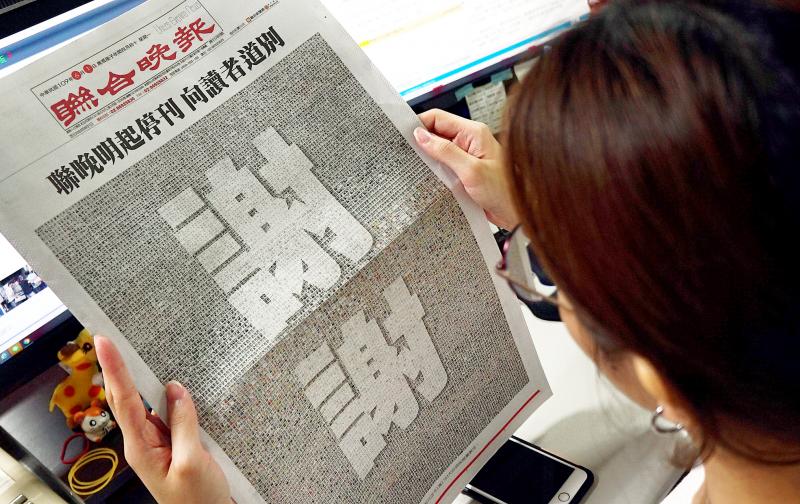The nation’s last evening newspaper closed after publishing its final edition yesterday.
The Chinese-language United Evening News said in a statement that it decided to end publication due to the “changing habits of readers, development of digital media and the COVID-19 outbreak.”
“The decision to cease publication starting [today] was finalized this [yesterday] morning, but we had been evaluating that option over the past few years,” managing editor Wang Mao-chen (王茂臻) said.

Photo: CNA
Wang said that the newspaper’s circulation had been declining annually, as have other print media in the nation.
“However, we cannot break even anymore with the circulation we have at the moment,” he said.
It said it would offer subscribers a refund or allow them to transfer their subscription to another United Daily News Group (UDN) publication, and it would retain all of its reporters.
The front page of its final edition featured images of its 11,783 front pages published over the past 32 years and three months with the text “thank you” in Mandarin in large font.
UDN founder Wang Tiwu (王惕吾) established the newspaper on Feb. 22, 1988, shortly after the government on Jan. 1, 1988, lifted a newspaper ban.
It was the nation’s first Chinese-language paper to print in landscape orientation.
“As the only evening newspaper in the nation, the United Evening News has accomplished its purpose in the nation’s history of development. We thank our readers for their support, which has helped sustain us for more than 10,000 days,” it said.
In February, Chinese-language weekly tabloid Next Magazine folded its online publication after ending its print edition in 2018.
In addition to the United Evening News, the nation previously had two other evening newspapers: China Times Express and Independent Evening Post, founded in 1988 and 1947 respectively.
The China Times Express ended publication on Oct. 31, 2005, due to shortfalls in advertising revenue as 24-hour cable TV news rose in popularity.
It also experienced a sharp decline of subscribers following an economic slump, the rising influence of online news and the Taiwan Stock Exchange’s decision to extend trading until 1:30pm.
Its management tried unsuccessfully to negotiate a merger with United Evening News.
The Independent Evening Post distinguished itself as unaffiliated with political parties.
It ceased publication on Oct. 2, 2001, after years of financial losses and management changes.

The Ministry of Economic Affairs has fined Taobao NT$1.2 million (US$36,912) for advertisements that exceed its approved business scope, requiring the Chinese e-commerce platform to make corrections in the first half of this year or its license may be revoked. Lawmakers have called for stricter enforcement of Chinese e-commerce platforms and measures to prevent China from laundering its goods through Taiwan in response to US President Donald Trump’s heavy tariffs on China. The Legislative Yuan’s Finance Committee met today to discuss policies to prevent China from dumping goods in Taiwan, inviting government agencies to report. Democratic Progressive Party Legislator Kuo Kuo-wen (郭國文) said

The Ministry of Economic Affairs has fined Taobao NT$1.2 million (US$36,900) for advertisements that exceeded its approved business scope and ordered the Chinese e-commerce platform to make corrections in the first half of this year or its license would be revoked. Lawmakers have called for stricter supervision of Chinese e-commerce platforms and more stringent measures to prevent China from laundering its goods through Taiwan as US President Donald Trump’s administration cracks down on origin laundering. The legislature’s Finance Committee yesterday met to discuss policies to prevent China from dumping goods in Taiwan, inviting government agencies to report on the matter. Democratic Progressive Party

Taiwan and its Pacific ally Tuvalu on Tuesday signed two accords aimed at facilitating bilateral cooperation on labor affairs, according to Taiwan’s Ministry of Foreign Affairs (MOFA). The governments inked two agreements in Taipei, witnessed by Foreign Minister Lin Chia-lung (林佳龍) and visiting Deputy Tuvaluan Prime Minister Panapasi Nelesone, MOFA said in a news release. According to MOFA, the agreements will facilitate cooperation on labor issues and allow the two sides to mutually recognize seafarers’ certificates and related training. Taiwan would also continue to collaborate with Tuvalu across various fields to promote economic prosperity as well as the well-being of their

Sung Chien-liang (宋建樑), who led efforts to recall Democratic Progressive Party (DPP) Legislator Lee Kun-cheng (李坤城), was released on bail of NT$80,000 today amid outcry over his decision to wear a Nazi armband to questioning the night before. Sung arrived at the New Taipei District Prosecutors’ Office for questioning in a recall petition forgery case last night wearing a red armband bearing a swastika, carrying a copy of Adolf Hitler’s Mein Kampf and giving a Nazi salute. Sung left the building at 1:15am without the armband and covering the book with his coat. Lee said today that this is a serious